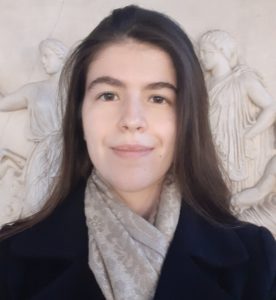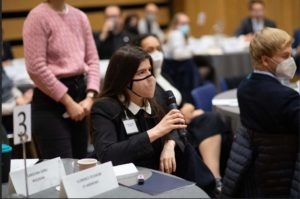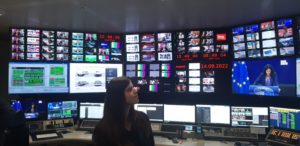2022-2023 Europaeum Scholar Experiences – A Blog by Florence Felsheim
Founded in 1992 by the University of Oxford, the Europaeum is an association of eighteen of Europe’s leading universities, including the University of St Andrews which has been an active part of the network since 2017. The network hosts the Europaeum Scholars Programme that supports talented people to make a difference across Europe.
The programme runs alongside a PhD and aims at highly motivated PhD students in the Humanities or Social Sciences. In this blog series about Europaeum scholar experiences, we hear from current PhD students who are engaged in the 2022-2023 programme.
In our third and final blog, Florence Felsheim, PhD candidate in the School of Classics at the University of St. Andrews shares her experience as a Europaeum Scholar.

Experiences as a Europaeum Scholar
My name is Florence, I am a second year PhD student in the School of Classics, working on a cultural history project analysing the impact of social structures on individual lived experiences. Prior to this, I have pursued an MA (Hons) and an MLitt, also in the School of Classics, and have written extensively on topics such as human trafficking in the ancient world, the political landscape of Ancient Rome, the cognitive sciences of religion, and the instrumentalisation of historical figures and events for modern political purposes.
At both undergraduate and postgraduate levels, I have always privileged interdisciplinary methodologies in my work in pursuit of diversely informed conclusions. This, along with my desire to bridge my studies with my interest in European politics, led me to apply to the Europaeum Scholars Programme, an 18-month policy and leadership course bringing together doctoral students from a wide range of academic backgrounds.

It has been a fantastic experience so far to embark on different modules, converse with fellow doctoral students on the challenges facing Europe, visit important institutions, and attend a broad palette of conferences ranging from cybersecurity to investigative journalism. Each module has a specific theme (for example, media landscape or policy analysis) and our activities, discussion groups and conferences are tailored to tease out different nuances of this theme. In this way, each day of the week brings new key insights from ethical, judicial, political or philosophical points of view, which change our perspectives in fascinating ways. Now that we are reaching the 4th module (out of 8), I can confidently say that the Europaeum is a top highlight of my PhD journey. Not only have I widened my academic horizon through intensive, in-depth examination of crucial topics such as the war in Ukraine, media plurality, violence against women, or the climate crisis, but working with a diverse group of energetic, talented and high-achieving doctoral students committed to bettering Europe has been a uniquely rewarding experience.

As the first Classicist to embark on the Scholars Programme, I was quite nervous to begin with.
After all, students of ancient history often have to face questions about the relevance of our field in regard to modern-day affairs. But I was delighted by how quickly I found my footing during our first module thanks to the skills provided by my academic background: political analysis, source examination, interdisciplinary thinking, long-term impact studying. I was able to consistently contribute new insights to different modern-day challenges and adapted my skill set to the relevant issues at hand.
Furthermore, my previous research and my current PhD project proved to be fertile discussion grounds for the themes of the Scholars Programme’s modules. For instance, my research on human trafficking in Antiquity proved useful for our conference on gang-affected women, and my work on the politicisation of the past could be connected to modern issues of nationalism and misinformation. The themes of my PhD research on ancient Europe are also still extremely relevant today: cultural exchange, immigration, religious communities, discrimination, and identity. At every module, I had opportunities to present certain points of view through a different, historically focused lens — a feature I am also bringing to our group project. It has been rewarding not only to bring these points of view to the discussion, but to watch all the other Scholars do the same with their extensive knowledge, skill sets and backgrounds, contributing to some of the most thought-provoking and insightful conversations I have had the pleasure of participating in during my academic career.
All in all, it has been fascinating and enriching to connect my doctoral research to the world of European policymaking, and to be part of such an incredible group of doctoral students. I am eager to see where the journey will lead and look forward to our next module in Lisbon!
If you wish to discuss the Europaeum Scholars Programme, please contact the [email protected] or Europaeum Programme Director, Dr Tracey Sowerby.